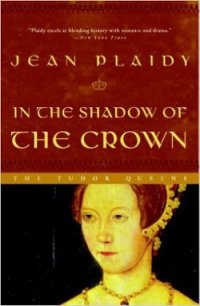Royal Road to Fotheringhay - Plaidy Jean (читать книги полностью без сокращений .txt) 📗
The Queen of England had no love for her Scottish rival but she had a strong desire to preserve the dignity of royalty. She wrote warningly to Mary, but her warning meant nothing to the Queen of Scots. The Queen of England was governed by ambition; the Queen of Scots by her emotions which were now concentrated on the passion she felt for one man. Her hand was in that of her lover, and if he were dragging her down to destruction, he was with her and nothing else seemed of any real importance.
ON A BRIGHT April day Mary set out for Stirling Castle in order to visit her son. She did so at the secret command of Bothwell. He himself had declared his intention of going to Liddesdale where fighting had broken out and his firm hand was needed.
She took with her a small retinue in which were included the lords Maitland and Huntley and Sir James Melville. As she rode out of Edinburgh the people came out to look at her. They were pleased that Bothwell had left the capital; Mary’s lovely tragic face softened the hearts of the people to such an extent that they could not believe her to be guilty of murder.
“God bless Your Grace!” called the citizens; but they added: “If you be innocent of the King’s murder.”
If she be innocent! Mary shuddered. What would she not give to be innocent? Everything she possessed but one thing—the love of Bothwell.
Lord Maitland, riding beside her, was filled with fury against her and Bothwell. He saw clearly now how Bothwell had duped the lords, how he had secured their help in the murder of Darnley—not to rid Scotland of an encumbrance, but to remove the Queens husband that he, Bothwell, might marry her.
That he should have been so used was galling to Maitland. He determined now that if Bothwell married the Queen they should never rule Scotland together. Maitland and Bothwell could never be anything but enemies.
Maitland had wished to serve the Queen. His wife was a very dear friend of the Queens. He had worked faithfully for her until that time when she had taken Rizzio into her confidence and set him above Maitland. Now he saw that he had, with others, been Bothwell’s dupe, and he was determined that he would never accept that man’s domination.
Huntley looked sly. Maitland wondered what plans he had made with Bothwell, and as Bothwell was his brother-in-law, Maitland could guess. Bothwell would need Huntley’s help if he were to break free from his wife.
Maitland must be on his guard. He had seen too much; he had been too clever. Bothwell, who had so cleverly rid the Queen and himself of Darnley, would have little compunction in being equally ruthless with others who threatened their schemes.
These were uneasy thoughts for Maitland on the road from Edinburgh to Stirling.
The Earl and Countess of Mar, who were the guardians of the little Prince, greeted the Queen with suspicion. News had traveled and they knew of the paper Bothwell had more or less forced the lords to sign. It occurred to Mar that it might be the plan of the Queen and her lover to kidnap the Prince. Mar was not going to lose his precious charge, and he made that quite clear.
Mary held the baby in her arms. He was ten months old, a solemn-faced, wise-looking little boy. He gazed with wonderment at his mother and she, smiling, let his little hand curl about her finger. He was placidly curious as she covered his face with kisses.
If she could take him away with her, live quietly in a nunnery with him, perhaps she would in time forget that she had any desire but to care for him. But such would never be allowed. Already the Earl of Mar was watching her suspiciously; insistent hands were stretched forward to take the baby from her. She was not allowed to be alone in the nursery.
“I am sorry, Madam,” said the Earl. “The Prince has been accorded to my care and I have sworn to watch over him, night and day.”
“Even when he is with his mother?”
“At all times, Madam.”
So this was the state to which she was reduced—a mother who might not be alone with her child! She told herself fiercely: Soon it will be different. When I marry, my husband will stand beside me and there shall not be a lord in Scotland who dares treat me thus.
They left Stirling on the third day. Her spirits were high, for she had always been happy in the saddle and she knew what was waiting for her on the road.
It was arranged between them. He would be there… towering above all men, striking terror into her escort, seizing her person, taking her as his prisoner to Dunbar, and there boldly—as the world would think—forcing her to submit to him. All would be well, for her future was in his hands.
But as they came nearer to Edinburgh she grew uneasy. He should have appeared before this. They were within a mile of Edinburgh Castle itself and unless he arrived almost immediately their plan would miscarry. But he did not disappoint her. She heard the sound of horses’ hoofs pounding on the quiet earth as she rode into Foulbriggs, the small hamlet between Coltbridge and West Port; and as she was about to cross the foul stream—from which the place took its name and which was swollen with the filth from the city—Bothwell’s strong force came into view. Blades gleaming, pikes aloft, they surrounded the Queen’s small company. Bothwell rode up to her.
“What means this?” she asked.
“Madam,” said her lover. “I must ask you to turn your horse and ride with me to Dunbar. You are my prisoner; but have no fear. No harm shall come to you if you obey.”
A young captain rode forward and prepared to do battle with Bothwell for the sake of the Queen.
“Put your sword away, my friend,” said the Queen. “I command you to do so.”
“I’ll take care of the young fool,” growled Bothwell.
“There shall be no bloodshed,” said the Queen.
The young soldier turned to Mary, his eyes alight with that devoted admiration which she so often inspired. “Madam, I would die to save you.”
She smiled, and her smile was her answer. The young man knew that she was by no means disturbed by this adventure, that she was Bothwell’s very willing prisoner.
Maitland cried: “What means this?”
Bothwell flashed a brilliant smile in his direction. “Patience, my lord Maitland. Soon you will know.”
He then dismissed most of her retinue, but kept Lord Maitland, Lord Huntley and Sir James Melville with him; and the journey to Dunbar began.
The Queen rode ahead and Bothwell was beside her.
MARY WAITED in the apartment at Dunbar Castle which had been prepared for her.
Soon he would join her. She could close her eyes and imagine that she was in the Exchequer House on that evening before it all began. It would be just like that. They would enact that scene once again, and the whole world should believe that it was the first time it had taken place.
Bothwell would stand exposed to the world as the Queens ravisher, and as his innocent victim she would declare that she must marry him. As for the unborn child—that would have to be explained later. It was imperative that she marry hastily, that the whole world should not be too shocked by her marriage, and that suspicions that she had been an accomplice in her husbands murder should be allayed.
It was a desperate scheme but their position was desperate. When she had glanced at his stern profile as he rode beside her from Foulbriggs to Dunbar Castle, she had reveled in his strength, in that power within him. How willingly would she surrender! How happily she waited for her ravisher!
In a room below, Melville was remonstrating with Bothwell. Maitland stood aloof; he knew too much. He understood that the Queen and Both-well were already lovers. He knew that this was just another bridge which they had to cross together.
Melville said: “Bothwell, know you not that this is treason? You are unlawfully detaining the Queen. For what purpose?”




